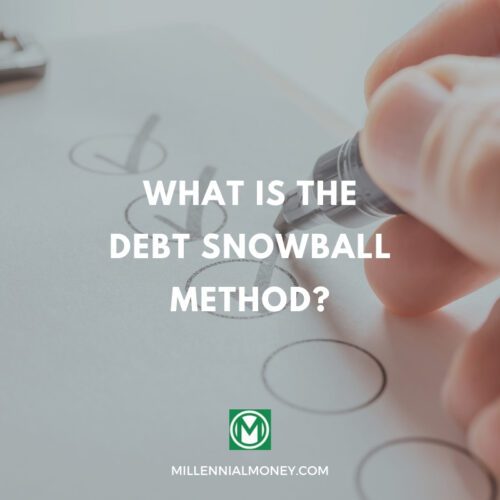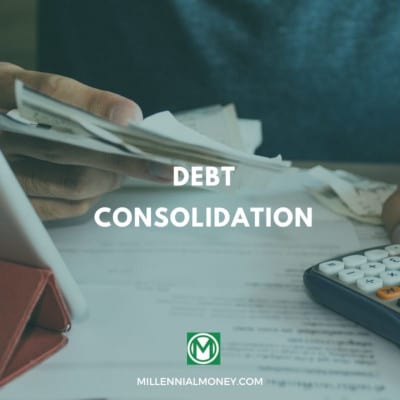Debt is an uncomfortable subject. Discussing our personal finances is somewhat taboo and acknowledging our debt can induce anxiety.
According to Debt.org, American debt hit a record high of $13.2 trillion in 2018. While most of us have some form of debt, many people are unsure about how to deal with their debt.
Simply put, debt is owing money to a person or entity.
Debt is not always a bad thing. There are plenty of forms of debt that are completely legitimate and can even help your financial well-being.
It ultimately boils down to the amount of debt, the type of debt, and your ability to pay it back by managing your money properly.
What Are the Different Types of Debt?
All forms of debt can be divided into two categories: secured and unsecured.
What is Secured Debt?
Secured debt means that the creditor has an asset that acts as collateral on the debt.
The creditor does this by placing a lien on the asset, which is an agreement that allows them to repossess it if you fail to make payments. Auto loans and mortgages are examples of secured debt.
If you do not pay your mortgage or car loan, the creditor will foreclose on your home or repossess your car.
What is Unsecured Debt?
Unlike secured debt, unsecured debt does not have any assets to act as collateral. However, this doesn’t mean that you are free of consequences if you don’t pay.
The creditor of unsecured debt, like a credit card company, may sell your debt to a collections agency that will harass you for payment. If you still don’t pay, they may sue you or attempt to have your wages garnished.
Is Debt Good or Bad?
Not all debt is created equal. There are some forms of debt that can actually help you earn income in the long run, such as a mortgage or student loans.
The key to determining good debt versus bad debt is to think of debt as an investment. Certain debts have ROI’s (return on investment) that can justify taking them on.
It all depends on if the asset you are making payments on is appreciating or depreciating.
Credit Card Debt
Credit card debt is a common type of debt and an example of bad debt. People tend to accumulate credit card debt because of its inherent ability to let you spend more than you make.
A common mistake that people make is only making the minimum payment on their balance. Most people believe that as long as they make the minimum payment, they can avoid the fees that come with missing payments.
While this is true, it doesn’t prevent the credit card company from charging you interest on a carried balance. When a balance is carried at the end of the month, the bank will charge you interest for the entire amount.
If you make a habit of carrying a balance, your credit card debt can snowball out of control.
Medical Debt
Medical debt is another common source of debt for many people. The unfortunate truth is that medical debt often comes from an unexpected injury or surgery.
While it is ultimately a form of bad debt, it is difficult to label it that due to its unavoidable nature.
However, there are ways that you can manage medical debt. Payment plans, medical credit cards, and medical bill advocates are all resources to help you chip away at medical debt.
Car Loan Debt
The ultimate determinant of good debt versus bad debt is if the asset depreciates in value.
Obviously, anything that loses value over time is bad debt. A car is a great example of one of these things.
Many people will lease or buy brand new cars that have high monthly payments. When you pay for a brand-new car, you are paying entirely too much money for something that’s value depreciates quickly.
If you need a car for your commute, it is much better to purchase a used car.
Mortgage Debt
If you are responsible, mortgage debt is a type of good debt that can help build your wealth. A house is a financial asset whose value is likely to increase over time.
When you sell, you can make enough money off the sale to pay the lender back for the remainder of the loan and pocket the rest. Your credit score can also improve if you make all your mortgage payments on time.
However, it can turn sour if you take on a mortgage that is outside of your means and ultimately default on your mortgage payments. Also, people tend to forget about other expenses such as taxes or home repairs.
As long as you are able to afford your mortgage payments and any unexpected costs that come with home repairs, you are in the clear.
Business Debt
Because most businesses begin with a loan, small business debt can be an unavoidable part of every small business’s journey.
However, if the business is not performing as you had hoped, mounting debt on your small business loan can worsen things for you.
If you find yourself facing a cash flow problem, there are solutions to getting your feet back under you. Refinancing your loan and reducing spending can help you get a handle on your debt.
Student Loan Debt
While student loan debt is a burden that many of us face, it is ultimately considered a form of good debt.
There is a positive correlation between your future earnings and having a college degree, so you will likely see more income over your life because of it.
Student loans also have lower interest rates, which can make them more manageable than other forms of debt. Obviously, taking on student loan debt isn’t always a good idea if your degree doesn’t align with your career path.
Be sure to consider how your degree will contribute to your career before taking on student debt.
Collections Accounts
Having a debt in collections is no fun. Debt collectors are aggressive, unkind and an overall nuisance.
A financial account goes into collections when the original creditor sells the delinquent account to a third-party collection agency. The hope is that the collections agency can harass you enough to make payments when the original creditor does not want to waste any more resource trying to get you to pay.
When one of your debts moves to collections, this will negatively impact your credit score. This can affect your ability to qualify for certain loans or low-interest rates. Be sure to communicate with your collectors and original lenders if you have an account in collections. Communication can be all the difference.
What Happens When You Don’t Pay Your Debts?
When you don’t make payments on a loan, the loan becomes delinquent.
If the loan is secured by an asset lien, the creditor will seize the asset and may charge you for additional costs after the auction.
If the debt is unsecured, the creditor will sell the debt to a collection agency. You will then be harassed by creditors until you make payment.
Defaulting on any loan will negatively impact your credit score. A low credit score can prevent you from qualifying for loans, credit cards, or low-interest rates.
Do I Have Too Much Debt?
The majority of us have debt. As previously mentioned, some forms of debt can be healthy and help us earn more income in the long run.
However, it is important to recognize when you have an overwhelming amount of debt. The best way to determine this is to look at your debt-to-income ratio.
If your debt load, or the amount of money that you use to pay off your debts, is more than 40%, you could have a debt problem.
Here are a few warning signs that you could have a debt problem:
You are living paycheck to paycheck.
Having no money left at the end of the month could point to a debt problem.
Ideally, you should be putting some of your income into short-term and long-term savings account to plan for future expenses or for rainy days.
If you find that you are barely scraping by, and are longing to escape living paycheck to paycheck, this could be indicative of a debt issue.
Your finances cause you to lose sleep or affect your work performance.
Debt-related stress can have an enormous impact on your well-being. If you find yourself lying awake at night worrying about how you are going to pay your bills, you likely have a problem with debt.
You aren’t contributing to a retirement fund because you need the money.
Retirement funds are essential to your future well-being. Putting aside money for your retirement is part of securing your financial future.
Some employers will even contribute to your retirement fund or match your contributions (free money!) Not making retirement contributions out of necessity could point to a larger problem.
How Do I Find Out All of My Debt?
Many people don’t know how much they owe because they are scared to check.
The first step to paying off your debt is finding out how much you owe. Tracking down your debt can feel impossible, especially if your original creditor has passed your debt off to a third-party collector.
There are several ways that you can track down your debts, including reviewing your credit report or contacting your original creditors.
Check your credit report
The first thing you should do when embarking on finding old debts is checking your credit report. By law, you are entitled to one free credit report per calendar year.
Most loan accounts are reported to three major credit reporting agencies:
- TransUnion
- Experian
- Equifax
Each creditor or collection agency should have contact information listed. If you have any questions, reach out to them.
You may see one of your existing debts listed twice on your credit report. Don’t panic. It is likely that the original creditor reported it and the collection agency reported it as well.
How Do I Pay All My Debt?
Once you find out how much you owe, then you are ready to make a plan to pay it off and get out of debt. This is typically where people get discouraged.
Just remember that you are not the first person to have debt and there are strategies you can use to pay it off.
Debt Snowball
Debt snowball means that you begin by paying off the smallest debts first and then paying for larger and larger debts. This can help debtors feel accomplished early on and encourage them to continue making payments on their debts.
Debt Avalanche
Debt avalanche means that you begin paying off the debt with the highest interest rate. This can be helpful because these are the debts that can add up quickly. Eliminating them first can help the amount you owe from continuing to accumulate quickly.
Debt Management Plan
If you find that you are not making much progress on your own, you may want to consider seeking the assistance of a nonprofit credit counseling agency.
They can work with your creditors to help lower interest rates and eliminate any penalty fees. They will then set up a payment plan for you that allows you to pay off your debt within a few years.
Debt Consolidation
A good way to score a lower interest rate on all your debts is to consolidate them. This allows payments to be much easier to make and you can pay them off in a shorter period of time.
You can consolidate debt in a few different ways, such as taking out a personal loan or using a balance transfer card.
What Is Debt Relief?
How many times have you wished your debt could just disappear? Perhaps you’ve even considered debt relief programs.
Debt relief programs are in place to help people regain control of their finances, but they are not without their drawbacks. Certain debt relief programs, such as bankruptcy, can wreak havoc on your credit for up to ten years.
Before you throw your unpaid bills to the breeze, make sure debt relief is the best option for you.
Do I qualify for debt relief?
If your debt load is at least 40%, you could benefit from some form of debt relief. Debt relief does not automatically mean bankruptcy.
The five most common forms of debt relief are:
- Credit Counseling
- Debt Management
- Debt Counseling
- Debt Settlement
- Bankruptcy
Most courts will require that you seek credit counseling before filing for bankruptcy or debt settlement. Both bankruptcy and debt settlement will have dramatic impacts on your credit score and can prevent you from making large financial decisions.
However, if you find that almost half your salary is going towards debt payments, you could likely use some form of debt relief.
What is Debt Forgiveness?
Debt forgiveness is when creditors wipe out your balance if you liquidate some of your assets or pay a portion of your debt.
As mentioned before, debt forgiveness programs are not without their consequences. They can decimate your credit score and prevent you from making big financial decisions until you build it back up. There are different kinds of debt forgiveness based on the debt that you would like to dismiss.
If you are considering debt forgiveness programs, be sure to discuss your circumstances and options with a bankruptcy lawyer. They will know best if you truly qualify for bankruptcy or debt settlement and the best type of debt relief for you to pursue.





No comments yet. Add your own